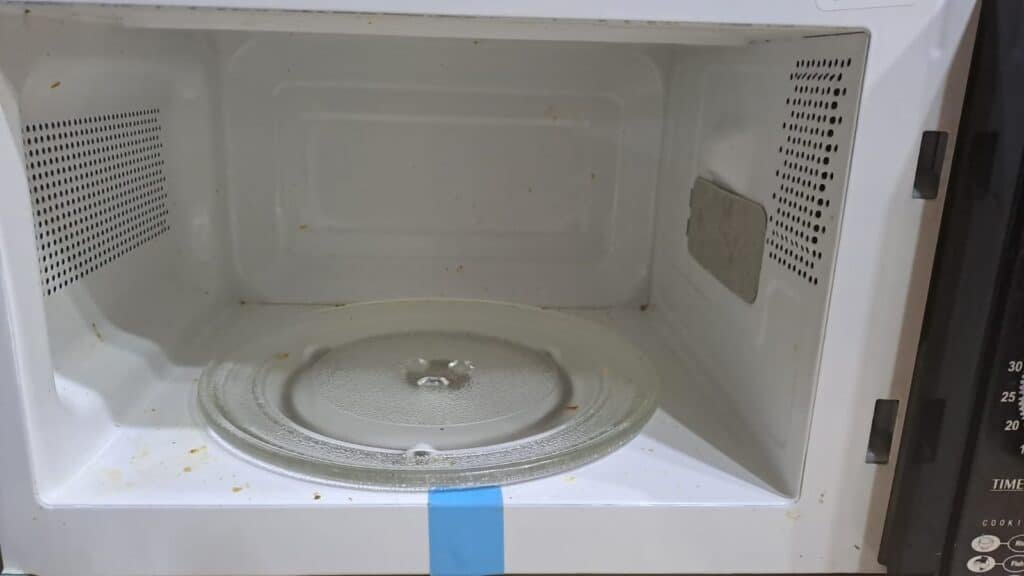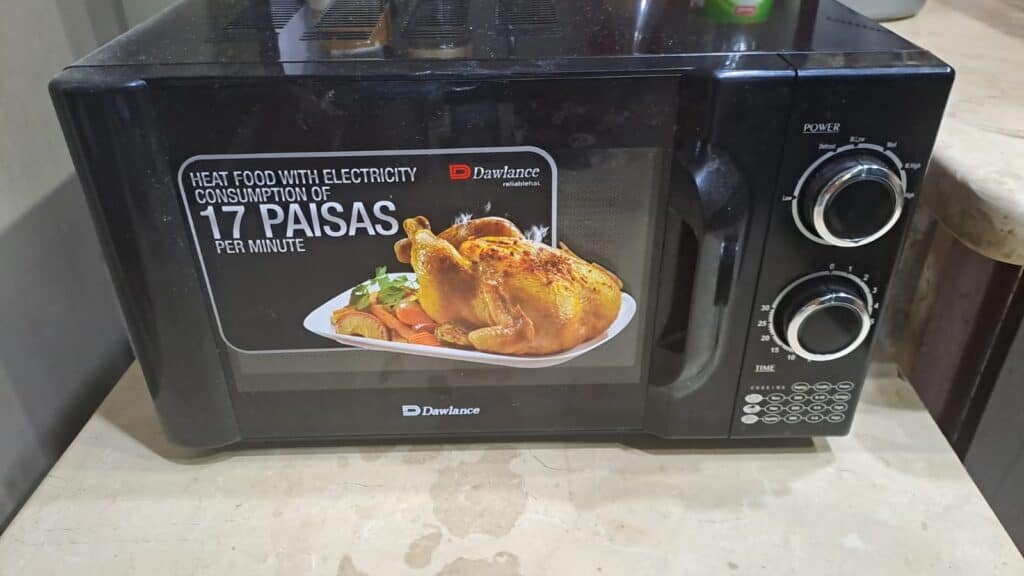Ants in the microwave can be an unexpected and frustrating problem. What is the secret ingredient that will ensure a swift and ant-free microwave? Here’s the answer:
To get rid of ants in your microwave, start by disconnecting the power. Remove any food or debris that may be attracting them. Clean the microwave’s interior thoroughly with a mixture of vinegar and water which is good at repelling ants. Seal any entry points, and use ant baits or repellents near the microwave.
In this comprehensive guide, we’ll explore the reasons behind their intrusion, uncover effective strategies to eliminate them, and restore your microwave to its ant-free glory.
So, if you’re ready to reclaim your kitchen and bid farewell to those pesky microwave invaders, keep reading. The solution is just a few paragraphs away.
4 Reasons Why Ants Are Attracted to Your Microwave

Here are a few reasons why ants are attracted to your microwave:
Food Residues
Ants are often drawn to microwaves due to the presence of food residues. Even the tiniest crumb or spillage can be a feast for these persistent creatures. Their keen sense of smell leads them straight to your microwave, where they can find a potential treasure trove of food particles.
Warmth and Shelter
Microwaves provide a warm and cozy environment for ants to seek refuge, especially during colder seasons. The heat generated by the appliance creates an inviting space, making it an attractive spot for ants to nest and reproduce.
Access Points and Trails
Ants can find their way into microwaves through small cracks, gaps, or damaged seals. Once they discover a route, they leave behind pheromone trails, which act as breadcrumbs for other ants to follow.
These trails allow them to navigate back and forth from their nest to the microwave, perpetuating the infestation.
Scavenging Behavior
Ants are highly resourceful and opportunistic scavengers. They are constantly on the lookout for food sources, and your microwave may unwittingly become their target.
The scent of food wafting from the appliance can attract ants from afar, leading them straight to your kitchen and ultimately inside your microwave.
Ants Behind the Microwave: Where Are They Coming From?
When you find ants behind your microwave, it’s important to trace their origin to eliminate the infestation effectively. Here are a few common sources from which ants may be coming:
- Entry Points: Ants can enter your kitchen through tiny cracks in walls, gaps around pipes, or openings in windows and doors. They may follow scent trails left by other ants or be attracted by food odors.
- Nesting Sites: Ants establish their nests in various locations, such as wall voids, cabinets, or even inside electrical outlets. If the microwave is against a wall, ants may be using these hidden spaces as their home base.
- Food Sources: Ants are adept at finding food sources. If there are spills, crumbs, or improperly stored food near or behind your microwave, it can attract ants and serve as a starting point for their exploration.
- Electrical Wires: Ants, particularly certain species like fire ants, may be attracted to the warmth generated by electrical wires. If there are exposed or damaged wires behind the microwave, they could serve as a pathway for ants.
- Plumbing Pipes: Ants can use plumbing pipes as a highway into your kitchen. Leaky pipes, drains, or gaps around pipes can provide an entry point for ants, allowing them to infiltrate the area behind the microwave.
Can Ants Damage a Microwave?
Microwaves can indeed be damaged by ants, even if they are not visible. Ants can infest the electronic boards of the microwave, making it difficult to reach and eliminate them.
In such cases, the only solution is to take the microwave to a service repair center. This highlights the importance of dealing with ant infestations promptly, even if you spot just a single ant.
Ants can also pose fire and shock hazards, as dead ants accumulate and generate heat or bridge electricity.
Can a Microwave Kill Ants?
Microwaves work by generating radio waves that cause water molecules in food to vibrate, generating heat that cooks the food.
Regarding the impact of microwaves on ants, several theories have been proposed:
- Ants are too small to be affected by microwaves as the wavelengths of these waves are quite large.
- Ants contain too little water for them to be affected by the microwave.
- The chitin (ants’ exoskeleton material) could potentially resist microwaves.
Ants, being relatively small, could potentially position themselves between microwaves and in the process, remain entirely unharmed.
Moreover, ants have one of the largest body surface areas to volume ratios. This property allows them to cool down really fast. So, if an ant were caught in a high-energy zone within the microwave, its body surface area advantage would help it cool down quickly while moving to a low-energy zone.
As a result, ants could potentially survive in a microwave, despite the intense environment.
Can You Spray Pesticide Inside of a Microwave?
While it’s technically possible to spray pesticide inside a microwave, it’s not recommended.
Pesticides can contain chemicals that are harmful to humans if ingested or inhaled, so using them in a microwave, which is intended for preparing food, could potentially contaminate the food you heat or cook in it.
Additionally, the heat from the microwave could cause the chemicals in the pesticides to break down into harmful compounds or could cause a fire if the pesticide is flammable.
Read also: Does Raid Kill Ants?
5 Ways to Get Rid of Ants in a Microwave

Picture this: you’re about to heat up your leftovers in the microwave, only to discover a trail of tiny ants scurrying around inside. An unwelcome sight, to say the least.
Here are some methods to eliminate ants in a microwave:
#1 Thorough Cleaning
Start by unplugging your microwave to ensure safety. Then, using a soft cloth or sponge, clean the interior of the microwave with a mild detergent or a solution of vinegar and water.
Vinegar is especially good at breaking down grease and eliminating odors. Pay special attention to corners and hard-to-reach areas where food residues might be hidden.
It’s important to remove all food residues, as these can attract ants. Once cleaned, dry the interior thoroughly to ensure no moisture is left behind.
#2 Seal Food Properly
Ants are attracted to food, so it’s essential to store food items in your kitchen properly.
Use airtight containers for storing both dry and cooked food. If possible, avoid leaving food out in the open for long periods of time.
Clean up any food spills promptly and ensure your kitchen counters and dining area are clean after every meal.
By eliminating their food sources, you can discourage ants from entering your kitchen and, subsequently, your microwave.
#3 Seal Entry Points
Ants are small creatures and can crawl into your microwave through the smallest of gaps or cracks. Inspect your microwave thoroughly to identify any potential entry points.
This could include gaps in the microwave door, vents, or any small cracks in the outer casing.
You can seal these with appropriate materials like silicone caulk, ensuring the ants cannot enter the microwave.
#4 Use Natural Repellents
Some natural substances are known to deter ants. These include cinnamon, peppermint oil, and vinegar. Try soaking cotton balls in these substances and placing them near the microwave, but not inside it.
The strong smell of these substances can help keep ants away.
However, remember not to apply these substances inside the microwave as they can create harmful fumes when heated.
#5 Citrus Peels
Ants do not like the smell of citrus. You can place citrus peels (from oranges, lemons, etc.) around your microwave to deter ants.
Alternatively, you can make a citrus peel spray by boiling citrus peels, allowing the water to cool, and then spraying it around the kitchen but not inside the microwave.
How to Prevent Ant Infestation in Microwave
Preventing an ant infestation in your microwave involves a combination of general kitchen cleanliness, proper food storage, and regular appliance maintenance. Here are some tips:
- Maintain Cleanliness: Keep your kitchen, especially the area around the microwave, clean and free from food spills and crumbs. Ants are attracted to food particles, so cleaning up after each meal is a great way to deter them.
- Clean Your Microwave Regularly: Food particles and spills inside the microwave can attract ants. Wipe the inside of the microwave with a damp cloth or a mild cleaner after each use to remove food splatters. Regularly deep clean your microwave with a vinegar and water solution to ensure it stays clean and ant-free.
- Avoid Leaving the Microwave Door Open: Leaving the microwave door open when it’s not in use can invite ants inside. Make it a habit to keep the door closed.
- Keep Your Kitchen Dry: Ants are also attracted to water. Make sure you wipe down your kitchen counters after washing dishes and keep the kitchen as dry as possible.
- Regularly Empty Trash Bins: Ants are attracted to the smell of food, which often emanates from trash bins. Make sure to regularly take out the trash and clean the bins to remove any lingering food smells.
Conclusion
Ants can be attracted to microwaves due to food residues, warmth, shelter, and access points.
Despite potentially surviving the microwave’s working mechanism, ants can cause damage to the appliance.
Effective elimination methods include thorough cleaning, sealing entry points, and using natural repellents.
Prevention involves maintaining cleanliness, proper food storage, and regular appliance maintenance. Overall, a comprehensive approach is required to reclaim your microwave from these tiny invaders.
FAQs
Is It a Good Idea to Microwave Food With Ants?
No, it is not a good idea to microwave food with ants. Ants can carry bacteria and other pathogens that may contaminate food. Additionally, microwaving ants can potentially damage the appliance.
Can I Use My Microwave on the Same Day I Eliminated the Ants?
Yes, you can use your microwave on the same day you’ve eliminated ants, provided it has been thoroughly cleaned and dried after the extermination process. Ensure no traces of ants or cleaning agents remain before use.

